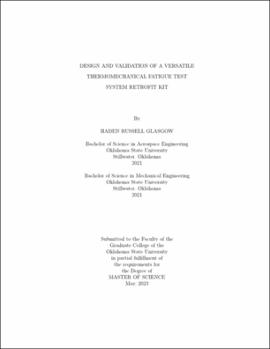| dc.contributor.advisor | Rouser, Kurt | |
| dc.contributor.author | Glasgow, Haden Russell | |
| dc.date.accessioned | 2023-08-25T20:06:01Z | |
| dc.date.available | 2023-08-25T20:06:01Z | |
| dc.date.issued | 2023-05 | |
| dc.identifier.uri | https://hdl.handle.net/11244/338916 | |
| dc.description.abstract | This paper presents the design and experimental validation of a low-cost thermomechanical fatigue (TMF) test system that can be retrofitted to a dynamic
load universal test machine with minimal modifications. The motivation for this study
is to fabricate a cost-effective and universally compatible thermomechanical fatigue
testing system that has the ability to evaluate ferromagnetic aerospace materials.
Typically, TMF test systems are available from an original equipment manufacturer
(OEM) for a complete system or as a retrofit kit, costing as much as $500,000 or
$300,000, respectively. Also, OEM equipment is not interchangeable with other systems
and requires manufacturer specific components to operate. An analytical study
was performed to design and size components to meet American Society for Testing
and Materials test standard E2368 with minimal cost. The resulting design consists
of an Arduino micro controller that reads instrumentation signals and a package of
components that do not rely on interfacing with external software or hardware to
perform a thermomechanical fatigue test. The specific test system hardware components
consist of a 10 kW induction heater, industrial chiller for induction coil operation,
cooling flow nozzles coupled with an air compressor, thermocouples mounted
outside the gauge section, an infrared pyrometer for temperature monitoring within
the specimen gauge section, and an axial extensometer to synchronize the thermal
and mechanical loading cycles. Validation of the system is completed by evaluating
the synchronization of thermal and mechanical loading cycles over a test matrix
with varying cycle times and loading parameters. The system operation follows a
set mechanical load and alters the thermal profile in response to match the profiles.
Initial experiments were conducted to tune heating and cooling process parameters
to achieve minimal load variance between mechanical and thermal loading profiles.
Subsequent experiments characterized response time variance at different loading cycle
frequencies and amplitudes. From experimental testing, it was determined the
system control scheme is correctly designed with existing components to maintain
synchronization within a certain frequency band and amplitude band for an indefinite
number of cycles. This study enables development of fatigue model validation
for predicting needed preventative maintenance, and improving supply chain management.
Further recommendations for this system may include an improved induction
heater that uses digital active control to regulate power output magnitude and an
improved air cooling system to regulate air flow rate in real time. | |
| dc.format | application/pdf | |
| dc.language | en_US | |
| dc.rights | Copyright is held by the author who has granted the Oklahoma State University Library the non-exclusive right to share this material in its institutional repository. Contact Digital Library Services at lib-dls@okstate.edu or 405-744-9161 for the permission policy on the use, reproduction or distribution of this material. | |
| dc.title | Design and validation of a versatile thermomechanical fatigue test system retrofit kit | |
| dc.contributor.committeeMember | Noori, Hadi | |
| dc.contributor.committeeMember | Harimkar, Sandip | |
| osu.filename | Glasgow_okstate_0664M_18169.pdf | |
| osu.accesstype | Open Access | |
| dc.type.genre | Thesis | |
| dc.type.material | Text | |
| dc.subject.keywords | inconel 718 | |
| dc.subject.keywords | retrofit | |
| dc.subject.keywords | thermomechanical fatigue | |
| thesis.degree.discipline | Mechanical and Aerospace Engineering | |
| thesis.degree.grantor | Oklahoma State University | |
